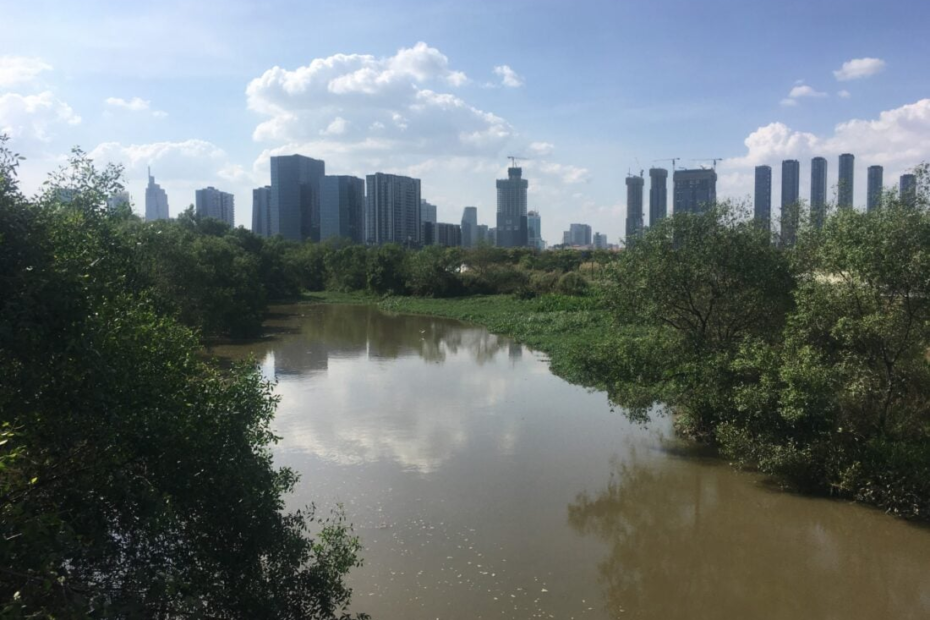Vietnam offers an enticing blend of affordability, rich culture, and modern amenities. With a vibrant entrepreneurial scene and a rapidly growing tech industry, Vietnam is a perfect destination for digital nomads. From bustling areas like Ho Chi Minh City and Hanoi to serene coastal towns like Da Nang and Nha Trang, I found that a … Read more
The post 10 Best Places in Vietnam for Digital Nomads appeared first on Goats On The Road.
Vietnam offers an enticing blend of affordability, rich culture, and modern amenities. With a vibrant entrepreneurial scene and a rapidly growing tech industry, Vietnam is a perfect destination for digital nomads.
From bustling areas like Ho Chi Minh City and Hanoi to serene coastal towns like Da Nang and Nha Trang, I found that a great work/life balance is particularly easy to attain in Vietnam.
Here’s a list of the 10 best places in Vietnam for digital nomads.
Best Places for Digital Nomads in Vietnam
I selected these 10 destinations based on their digital infrastructure, affordability, vibrant ex-pat communities, and diverse amenities, as well as their recreational and cultural experience offerings.
1. Ho Chi Minh City
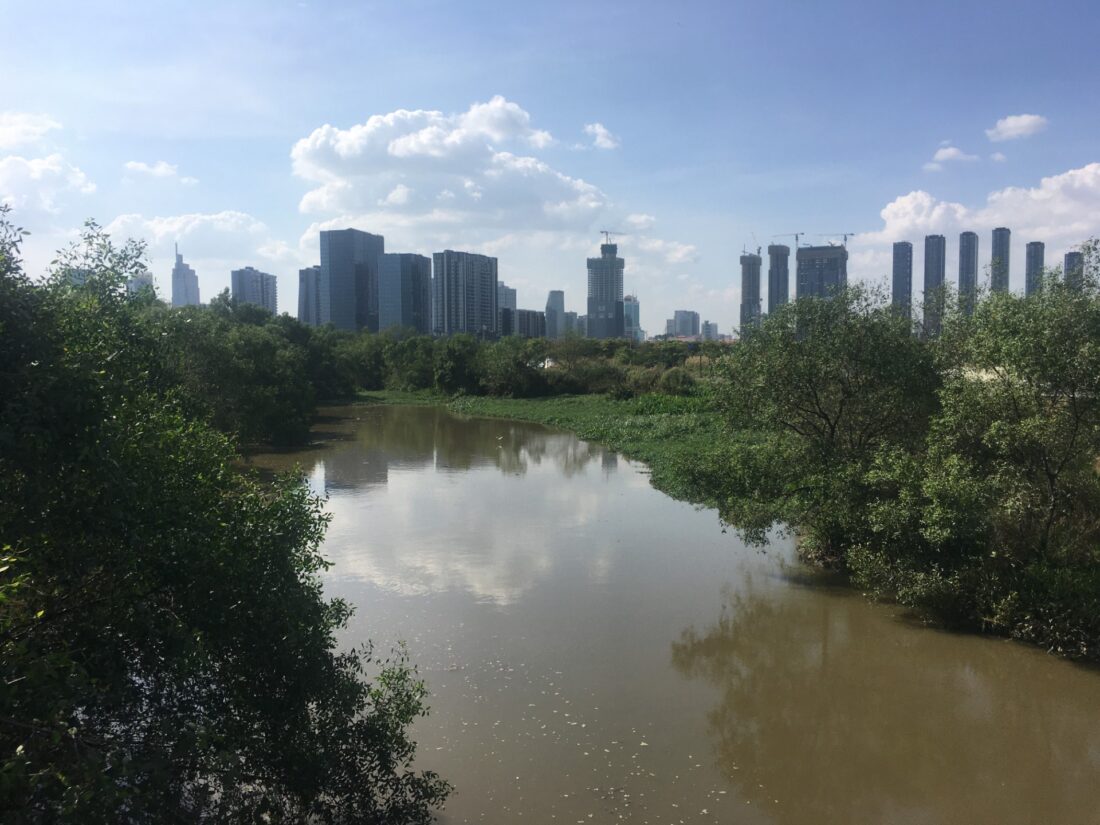
Ho Chi Minh is Vietnam’s largest city and is home to a dynamic energy and vibrant culture.
Why Ho Chi Minh is a Top City for Digital Nomads

I loved my time working in HCMC as a digital nomad. It’s an enticing place with many coworking facilities and modern amenities, and it’s a very affordable city to choose as a home base.
This is all helped by a large ex-pat community which lends itself to a supportive and comforting familiarity in a far-off country like Vietnam.
I found that fast and reliable WiFi is readily available pretty much everywhere, from shopping malls to street cafes. Data SIMs for added internet coverage are also easily purchased for very low prices. A daily 6GB of DATA cost me less than $5/month.
Cost of Living in Ho Chi Minh City
Ho Chi Minh City allowed me to enjoy a comfortable lifestyle at a fraction of the cost compared to many Western cities. The average monthly expenses for a digital nomad in HCMC can range from $700 to $1,200.
A one-bedroom apartment in the city center typically costs around $500 per month and a meal at a local restaurant will set you back less than $5. Public transport is also incredibly affordable, with a bus ride costing less than $0.50.
Coworking Spaces in Ho Chi Minh City

Coworking spaces are highly popular among digital nomads in Ho Chi Minh City. Geek Hub is a great option for anyone needing an affordable hot desk with prices under $1 for a session. WorkFlow is another excellent choice where you can book a work pod for less than $2/hour – it feels like your own little office.
How to Find Apartments in Ho Chi Minh City
Digital nomads won’t struggle to secure short or long-term accommodation through channels such as Airbnb and Booking.com. Ex-pat Facebook groups and house sitting sites like Trusted Housesitters also have regular listings for seeking digital nomads.
Pros and Cons of Living in Ho Chi Minh City

Here are a few pros and cons about life in Ho Chi Minh:
Pros
- Vibrant community: A welcoming ex-pat population, provides a sense of belonging and support for newcomers.
- Affordable cost of living: Compared to many Western cities, HCMC offers a relatively low cost of living.
- Culture: The city’s rich history offers many cultural attractions and exciting things to do outside of work.
- Vibrant social scene: Bustling streets, busy markets, and lively nightlife make Ho Chi Minh a captivating place.
Cons
- Noise Pollution: The busy streets and construction projects contribute to high levels of noise pollution.
- Air Pollution: Ho Chi Minh struggles with air pollution, particularly during the dry season.
- Traffic Congestion: The city’s roads can be congested and chaotic.
- Motorbike madness: Scooters and mopeds rule the city, and crossing a road can be a slow and dangerous endeavor.
2. Hanoi
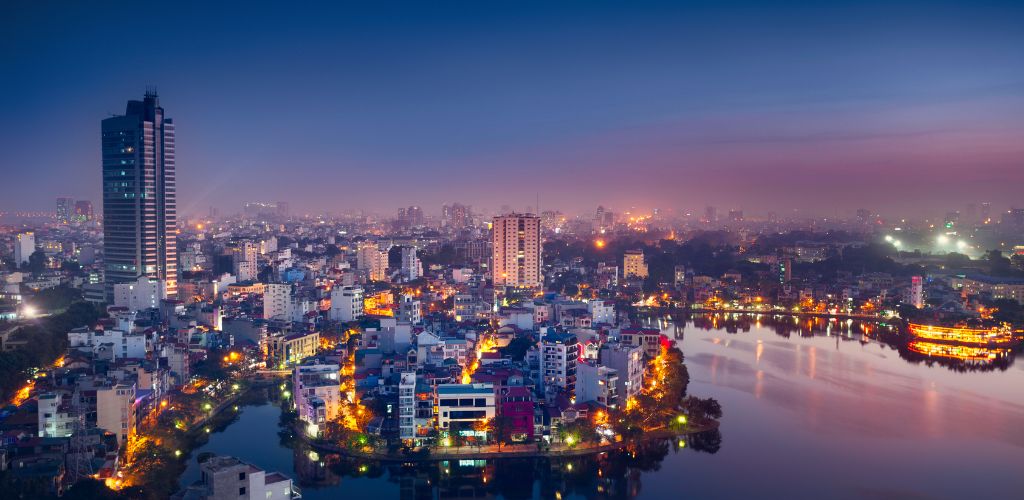
Hanoi is Vietnam’s historic capital city, renowned for its cultural wonders and timeless charm.
Why Hanoi is a Top City for Digital Nomads
Hanoi is one of the best digital nomad cities in Vietnam and has a vibrant landscape that’s ideal for remote working.
There’s an array of amenities available, catering to every possible working need. Coworking spaces, cafes with reliable WiFi, and affordable accommodation options are in abundance.
Cost of Living in Hanoi
It’s easy to balance work and life in Hanoi without breaking the bank. Monthly expenses for digital nomads will typically range between $600 to $1,000.
For example, renting a one-bedroom apartment in the city center can cost as little as $350/month. Enjoying a meal at a local eatery will set you back around $2.50 and the rideshare app Grab offers an affordable and efficient door-to-door service.
Coworking Spaces in Hanoi

Coworking spaces are thriving in Hanoi thanks to its growing community of digital nomads. Toong offers flexible membership plans starting at around $90/month.
Similarly, UP Coworking Space provides membership options with prices starting at $80/month and daily desks are readily available for under $5/day.
How to Find Apartments in Hanoi
Airbnb and Booking.com are again two excellent platforms that offer a wide range of options, from short-term rentals to long-term leases, catering to all budgets. Additionally, vietlonghousing.com is useful for those planning a longer stay.
Pros and Cons of Living in Hanoi

A capital city is always going to have plenty of pros and cons; here are the things I think you should be most aware of:
Pros
- Rich cultural experiences: Hanoi boasts a wealth of historical sites, museums, and cultural festivals.
- Affordable cost of living: Compared to many Western cities, Hanoi offers a relatively low cost of living.
- Delicious cuisine: Hanoi is renowned for its diverse and flavorful cuisine, with street food stalls, local markets, and upscale restaurants offering an array of delicious dishes.
- Vibrant street life: Hanoi’s bustling vibe adds charm and excitement to everyday living.
Cons
- Traffic congestion: Hanoi’s streets can be notoriously congested, especially during peak hours.
- Noise pollution: The busy streets and vibrant nightlife contribute to high levels of noise pollution in certain areas of the city.
- Air pollution: Hanoi struggles with air pollution, particularly during the dry season.
- Limited green spaces: Hanoi’s rapid urbanization has led to the loss of green spaces and parks, meaning fewer opportunities for outdoor recreation and relaxation.
3. Phu Quoc

Phu Quoc is a stunning Island in the south of Vietnam that offers beautiful beaches, lush countryside retreats, and a wonderful working location for digital nomads.
Why Phu Quoc is a Top City for Digital Nomads
How does working from a beautiful paradise island sound? Phu Quoc has everything a digital nomad could need amongst its natural beauty.
The island is a short flight from Ho Chi Minh but is also accessible from all major Vietnamese (and some International) airports. I found the pace of life in Phu Quoc to be a long way from HCMC where the energy is constantly pumping.
There are plenty of laptop-friendly cafes in Phu Quoc. I came across many digital nomads here opting for the beach life over the busy cities, and who could blame them?
Cost of Living in Phu Quoc
Expect to find decent accommodation for around $300/month. It’s not a huge island so getting around is fairly cost-effective too. Buses and the Grab app are both reliable and cheap.
Food and drink options aren’t expensive, whether dining out, buying in, or cooking yourself. I always found my monthly food budget to be under $200/month.
Coworking Spaces in Phu Quoc

I didn’t come across any dedicated coworking facilities, but there are tons of cafes with excellent WiFi. For example, Kin Cafe has nice views of the harbor and great coffee. Coffee Phu Quoc is another remote working option, with an open-sided front that is steps from the ocean.
How to Find Apartments in Phu Quoc
Apartments and hotels are easy to find on Booking.com and Airbnb as there’s a strong tourism industry presence, which means prices are competitive, even for Vietnam.
I managed to secure a house sit right on the beach whilst in Phu Quoc. Be sure to check out my previous article – 8 Expert Tips for Landing a House Sitting Job.
Pros and Cons of Living in Phu Quoc

Even paradise islands have pros and cons to consider:
Pros
- Natural beauty: Phu Quoc is a stunning location with beautiful beaches, lush greenery, and many idyllic locations.
- Affordability: Like much of Vietnam it is cheap to live in Phu Quoc.
- Hot weather: Temperatures range from very warm to very hot all year.
- Chilled atmosphere: Phu Quoc is a world away from the bigger vibrant Vietnamese cities
Cons
- Limited coworking spaces: There are minimal dedicated coworking facilities in Phu Quoc.
- Rain: Phu Quoc isn’t exempt from Vietnam’s rainy season which occurs between November and April.
- Connection issues: Intermittent WiFi can be an issue in Phu Quoc’s more remote regions.
- Distractions: The tropical paradise with its coral reefs and beaches can be a distraction from work.
4. Hoi An

Hoi An is a wonderful ancient town and a UNESCO World Heritage Site on Vietnam’s Central Coast.
Why Hoi An is a Top City for Digital Nomads
Hoi An has to be one of the best places to live in Vietnam and it’s a great spot for digital nomads. The cute cobbled and lantern-lit streets, busy markets, and tourism trade create an alluring mix of the old and new.
Hoi An quickly became one of my favorite spots in Vietnam. As well as the busy riverside Old Town area, a magnificent white sandy beach is just a 15-minute cycle from the center. I loved biking through the rice paddies, dodging water buffalos to chill with a beer on the sand after finishing my work for the day.
Cost of Living in Hoi An
I booked a nice hotel that included breakfast, a pool, a gym, and bike usage for under $25/night.
I made a real effort to frequent many traditional Vietnamese restaurants and street food options while in Hoi An. A decent meal with a drink rarely cost more than $5. In the Old Town, regular happy-hour deals are available daily.
Getting around can be super cheap as it’s a much safer environment to cycle than Hanoi or Ho Chi Minh City. Grab is always available and as cheap as anywhere else in Vietnam. A trip from the center to the beach should cost no more than $7.
Coworking Spaces in Hoi An

There are a couple of excellent coworking spaces in Hoi An. My local cafe – Bonte offers a comfortable airconditioned coworking space for under $1.50/day. Hub Hoi An Coworking is an amazing facility close to the beach, perfect for digital nomads in Vietnam.
How to Find Apartments in Hoi An
I used Booking.com and found a great hotel with loads of added perks. Regular users of Booking.com will be aware of the Genius Programme. Level 3 gets you some great benefits such as free breakfasts, room upgrades, and significant discounts on stays.
HoiAnNow.com is a handy site for anyone seeking to stick around for more than a month or so.
Pros and Cons of Living in Hoi An
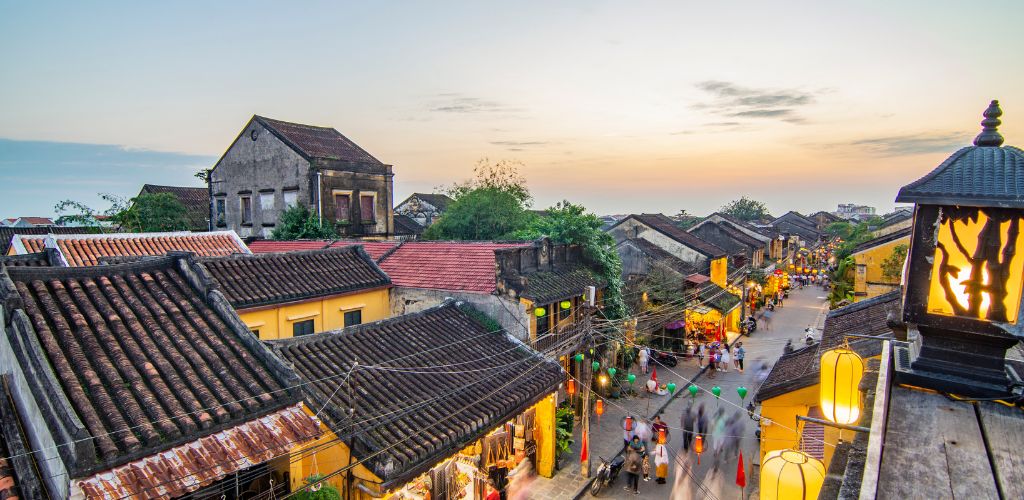
Let’s take a look at some of the good and bad points of Hoi An:
Pros
- Historic Old Town: With a mix of historic Vietnamese, Chinese, and Japanese culture, Old Town is simply stunning.
- Amazing beaches: I rank An Bang Beach as one of my favorite all-time beaches.
- Social scene: The many tourists create a bustling and vibrant scene with many bars, cafes, and restaurants.
- Night Market: The Hoi An Night Market is a great experience and ‘the’ place to go for street food, clothing, and nicknacks.
Cons
- Chaotic: Old Town is a fairly confined space and can at times feel very chaotic with the number of tourists.
- Limited coworking opportunities: A few good coworking spaces exist but far fewer than in Vietnam’s bigger cities.
5. Vung Tao

If you fancy a quick and easy beach escape from Ho Chi Minh City, Vung Tao is a great destination to consider.
Why Vung Tao is a Top City for Digital Nomads
After 6-weeks in Ho Chi Minh, I was ready for fresh sea air and some sand between my toes. Vung Tao is around 2-3 hours by ferry or bus and has plenty to offer.
Being the nearest beach town to HCMC, it’s a popular weekend retreat.
Vung Tao has all the facilities of a big city whilst being conveniently located on the beautiful coast. It’s easy to get to from HCMC and a great option for short (or long) breaks.
Cost of Living in Vung Tao
Being a popular tourist destination, my instincts told me to expect higher prices. However, accommodation, food, and drink are all very much in keeping with the rest of Vietnam.
Many of the ex-pat bars have a rewards system for beer, which bags you a free 5th or 6th bottle. I didn’t learn this until my final few days in Vung Tao! But with beer costing as little as $1, I wasn’t too distraught.
Small local street food restaurants are everywhere and a decent meal can be picked up for under $3. A decent meal out at a nice restaurant is likely to only cost around $15pp.
Coworking Spaces in Vung Tao

V-Office is a popular and all-encompassing choice for digital nomads in Vung Tao. Hot-desking starts at around $5/day. Lip Coffee is a great laptop-friendly cafe that has a beautiful patio with excellent coffee and views of the water.
How to Find Apartments in Vung Tao
As a popular escape from the city, there’s no shortage of accommodation options through Booking.com and Airbnb. If you’re planning a lengthy stay don’t be shy about asking Airbnb hosts for a discount.
Pros and Cons of Living in Vung Tao

Here are a few things about Vung Tao to consider:
Pros
- Vibrant social scene: As a busy tourist town and ex-pat hub there is always plenty going on socially.
- Fresh Air: The sea air can be a wonderful escape from the smoggy city.
- Cheap drinks: Happy hour deals and rewards programs are common among Vung Tao’s ex-pat bars.
- Cafe culture: Many cafes mean many idyllic laptop-friendly spots for digital nomads to work.
Cons
- Busy: During weekends and holidays Vung Tao sees an influx in tourist traffic.
- Few coworking options: Although many cafes and hotels offer facilities to work, dedicated office space for digital nomads is fairly limited.
- Healthcare: Vung Tao lacks the level of healthcare facilities of bigger cities like Hanoi or HCMC.
6. Da Nang
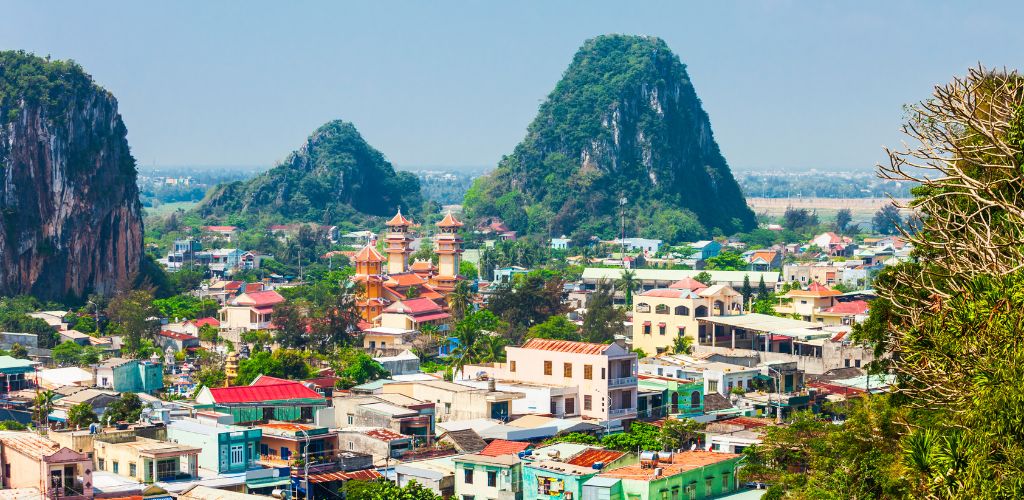
Da Nang is a rapidly developing city renowned for its stunning beaches, lush landscapes, and modern infrastructure.
Why Da Nang is a Top City for Digital Nomads
Around a 40-minute drive north along the eastern coastline from Hoi An is the wonderful city of Da Nang. It’s centrally located within Vietnam and also benefits from a large international airport, making onward travel straightforward and stress-free.
Da Nang has many modern coworking facilities and a familiar cafe culture. The bonus of some of the most spectacular beaches I’ve ever seen and iconic landmarks like Dragon Bridge create a perfect place to base yourself as a digital nomad.
Cost of Living in Da Nang
You’re likely to find more high-end restaurants in Da Nang that charge a premium by Vietnam standards, so a fancy meal might cost $25pp. But on average, rent for a city center apartment costs $350/month and meals can be widely purchased for under $2.
I’ve found that gym prices are comparatively high throughout Vietnam so, if, like me, you’re a keen gym user, expect to pay around $30/month at a decent gym.
Coworking Spaces in Da Nang

Ace Coworking is a wonderful facility a few streets back from the beach with everything you could need for under $1/hour. I also heard great things about Beans Workspace and at $3.50 a day, you can’t go wrong!
How to Find Apartments in Da Nang
As a popular tourist destination, Da Nang has many hotels and apartments listed on Booking.com and Airbnb.
If you’re planning to stay longer than a few days, booking an Airbnb for a month can often save you some cash.
Pros and Cons of Living in Da Nang

Here are things to consider for digital nomads considering Da Nang:
Pros
- Beaches: The beaches in Da Nang are extensive and beautiful.
- Access: Da Nang is in a great central location within Vietnam with an international airport.
- Coworking spaces: There are a ton of dedicated coworking spaces to choose from.
- Great social scene: Many ex-pats and digital nomads call Da Nang home, creating a friendly, social, and vibrant atmosphere.
Cons
- Weather: The rainy season heavily impacts Da Nang and typhoons are an occasional concern.
- Pollution: With rapid development comes noise and air pollution, especially in central areas.
- Language: Although many ex-pats live in Da Nang, many locals do not speak English.
7. Nha Trang

Located on Vietnam’s south-central coast, Nha Trang is home to some stunning beaches, numerous popular attractions, and a great restaurant and dining scene.
Why Nha Trang is a Top City for Digital Nomads
Trang is an excellent option for anyone seeking a taste of big city life with the vibe of a smaller beach town.
Nha Trang’s atmosphere and stunning coast make it a great place for post-work relaxation. You can walk on the pristine beaches, indulge in spa treatment, or explore nearby islands after closing the laptop for the day.
Cost of Living in Nha Trang
It’s a pretty cheap place to locate as a digital nomad in Vietnam. An apartment will cost around $350/month, whilst dining out, even at some of the fancier restaurants, won’t break the bank at $15pp.
I found street food to be slightly more expensive here, but only by a couple of dollars. However, a decent meal from the street food vendors is still usually around $4.
Coworking Spaces in Nha Trang

Stockholm Coworking is a great option for digital nomads in Nha Trang. It doubles up as an excellent Bistro and for $6/day you’ll get a comfortable space and a free coffee.
Smart Space is another top choice. Desks can be booked by the hour for as little as $1, or $6 for the day.
How to Find Apartments in Nha Trang
Nha Trang has a few dedicated websites for finding accommodation, especially if you’re planning a longer-term stay. Expat.com, nhatrangrenting.com, and nhatrang4rent.com are three sites worth exploring.
Get signed up on Trusted Housesitters and set alerts for Nha Trang sits – I’ve seen more than a few lengthy stays come up here.
Pros and Cons of Living in Nha Trang

Here are some Nha Trang pros and cons to be aware of:
Pros
- Stunning beaches: Nha Trang boasts some of Vietnam’s most beautiful beaches.
- Affordable cost of living: The low cost of living makes it a budget-friendly option for digital nomads.
- Outdoor activities: With its warm climate and scenic landscapes, Nha Trang is perfect for activities such as snorkeling, diving, and hiking.
- Vibrant ex-pat community: Nha Trang has a growing expatriate population.
Cons
- Seasonal weather: Nha Trang experiences tropical weather patterns, including heavy rainfall and storms during the wet season.
- Limited cultural amenities: It lacks cultural amenities such as museums, theaters, and art galleries.
- Traffic congestion: Like many Vietnamese cities, Nha Trang experiences some seriously heavy traffic congestion.
8. Hue

Hue is a captivating city for digital nomads in Vietnam to consider, with plenty of rich history, cultural heritage, and stunning landscapes.
Why Hue is a Top City for Digital Nomads
Situated along the banks of the Perfume River in central Vietnam, Hue served as the imperial capital of Vietnam during the Nguyen Dynasty and is adorned with majestic palaces, ornate pagodas, and ancient citadels.
Hue’s Imperial City, a UNESCO World Heritage Site, stands as a testament to its former glory, with imposing walls, grand gates, and intricate royal residences preserving the legacy of its former rulers.
Hue has beautiful serene landscapes, including expansive countryside, tranquil rivers, and scenic mountain ranges.
Cost of Living in Hue
Living in Hue is very cheap, even by Vietnam standards. The average cost of a 1 bedroom central apartment is around $150/month. This drops to $110/month if you’re willing to commute in from a little outside the city.
Across the board, prices are generally lower by at least a few dollars. Eating at a fancy restaurant isn’t likely to cost more than $12, a large bottle of beer works out at around $0.80, and cappuccinos can cost as little as $1.
Hue is one of the cheapest places I’ve come across anywhere in the world as a remote working location.
Coworking Spaces in Hue

There are a few dedicated coworking options in Hue. CoPlus is a great option if you’re able to commit for a month. The $50/month fee which includes preferential food and beverage rates is super cheap if you’re using it every day.
For more short-term options head to Second Home Workspace. A desk can be booked by the hour for a few dollars and they have an excellent cafe.
How to Find Apartments in Hue
As the cost of living is very low in Hue, this means much cheaper prices for apartments on Airbnb and Booking.com. Longtermlettings.com and expat.com also have many listings and can be a useful resource for longer stays.
Pros and Cons of Living in Hue

Here are some of the top pros and cons to know before considering the move:
Pros
- Rich historical heritage: Hue boasts a wealth of historical landmarks.
- Cultural richness: The city is a hub of traditional arts, music, and festivals.
- Scenic beauty: Hue is surrounded by picturesque countryside, mountains, and the Perfume River.
- Affordable cost of living: Compared to larger cities, Hue offers a considerably lower cost of living, especially for accommodation.
Cons
- Limited nightlife: Compared to cities like Hanoi or Ho Chi Minh, Hue’s nightlife scene is quieter.
- Tourist crowds: Being a smaller city, Hue’s attractions can become very crowded with visitors during peak tourist seasons.
- Limited public transportation: Hue does have a bus system, but public transportation options are fairly limited compared to larger Vietnamese cities.
9. Can Tho

Nestled in the heart of the Mekong Delta in southern Vietnam is Can Tho.
Why Can Tho is a Top City for Digital Nomads
Can Tho feels like a more laid-back city, whilst still maintaining many of the facilities remote workers require.
It’s a unique entry on this list as it’s neither a huge city nor close to a beach, but it offers traditional floating markets selling wares along an intricate network of canals to some exceptional dining options.
The city is also home to some spectacular architectural feats like the Can Tho Walking Bridge, and the Munirensay Khmer Buddhist Temple. The Military Zone 9 Museum is a fantastic exhibition with tanks and artillery remnants of the Vietnam War.
Cost of Living in Can Tho
The appeal of the traditional markets and the authentic nature of Can Tho drives a significant element of tourism but the cost of living here is uniformly low.
A central apartment for a month goes for around $200. Shopping via the floating markets will make groceries even cheaper than the supermarket.
The number of excellent seafood restaurants means the average meal in a fancy establishment is slightly higher than in other places I have seen. But, a great meal for $25 now and then shouldn’t sting too much, especially when street food options are readily available for under $2.
Coworking Spaces in Can Tho

There aren’t too many dedicated coworking spaces but some excellent laptop-friendly cafes can comfortably fill that void. Mossy Coffee & Tea has great WiFi, plenty of space, and excellent views of the Xo Xang Thoi Lake.
The Fast Fox Coworking Space has working spaces available and private meeting rooms can be easily booked. English-speaking social and networking events are held once a week. Overall it should cost less than $5/day including drinks.
How to Find Apartments in Can Tho
An Airbnb or an apartment/hotel room via Booking.com is the best way to go in Can Tho. Prices for month-long stays are very affordable but will be higher than securing a longer-term letting through a local agent. Expect to pay $350-$500/month for a decent central Airbnb.
Pros and Cons of Living in Can Tho

Let’s have a look at Can Tho’s pros and cons:
Pros
- Affordability: The relatively low cost of living makes Can Tho an attractive option for digital nomads on a budget.
- Scenic landscapes: Picturesque waterways, lush countryside, and scenic rice paddies, make perfect spots for relaxation and exploration.
- Relaxed lifestyle: With its laid-back atmosphere and slower pace of life, Can Tho provides a tranquil environment.
- Authentic experiences: Living in Can Tho means experiencing authentic Vietnamese culture, cuisine, and hospitality away from the crowds of larger cities.
Cons
- Limited infrastructure: Though improving, Can Tho’s infrastructure, including transportation and healthcare facilities, is not as developed as in larger centers.
- Seasonal weather: Like much of the Mekong Delta, Can Tho experiences tropical weather patterns, including heavy rainfall and occasional flooding.
- Few coworking spaces: Although many laptop-friendly cafes are available, there are minimal dedicated coworking options.
10. Hai Phong

Hai Phong, Vietnam’s third largest city, is located on its northern coast and is a bustling port city known for its scenic waterfront, breathtaking bays, and historical landmarks.
Why Hai Phong is a Top City for Digital Nomads
If you’re only planning one or two stops in Vietnam, be sure to make Hai Phong one of them. The city is a metropolitan hub for industry, business, and remote working.
If you’ve ever seen Instagram photos of Vietnam, chances are you’ve seen stunning images of Ha Long Bay. It’s around an hour away from downtown Hai Phong and is a must-visit!
This wonderful blend of city life and unbelievable natural beauty rightfully earns Hai Phong the final spot on this list. From a digital nomad’s perspective, it ticks all the boxes.
Cost of Living in Hai Phong
Despite being a hub for business, Hai Phong maintains a good level of affordability. A city center apartment will cost around $380/month, and you’ll find it a challenge to spend over $20pp on a three-course meal at a decent restaurant.
A well-established public transport system connects all the main areas of the city and a month pass is around $6. Grab is always available and short city journeys rarely cost more than $2.
Coworking Spaces in Hai Phong

For a dedicated workspace and chilled environment, G-Space is an excellent coworking option. A day pass is under $5 and includes a free coffee.
VIP Coffee is a great little cafe with decent WiFi, a gentle flow of customers, and inspiring views of the river.
How to Find Apartments in Hai Phong
In addition to the usual sources, Airbnb and Booking.com, tanlonghaiphong.com is a more localized letting agent with many local listings.
Pros and Cons of Living in Hai Phong

Here are a few of Hai Phong’s pros and cons to consider:
Pros
- Great location: Hai Phong’s position on the northern coast of Vietnam and its proximity to key areas like Hanoi and Ha Long Bay make it an ideal location for exploring.
- Cultural heritage: Hai Phong boasts many historical landmarks, temples, and colonial-era architecture.
- Scenic waterfront: With its location on the Gulf of Tonkin, Hai Phong offers scenic waterfront areas for relaxation and leisure activities.
Cons
- Pollution: Industrial activity in Hai Phong contributes to considerable air and water pollution.
- Traffic congestion: Like many urban areas in Vietnam, Hai Phong experiences traffic congestion, particularly during peak hours.
- Fewer ex-pats: There is considerably less of an ex-pat community in Hai Phong than in Hanoi or Ho Chi Minh City.
Best Places in Vietnam for Digital Nomads: FAQ’s
Here are some answers to the most commonly asked questions about the best places in Vietnam for digital nomads.
Yes, digital nomads who reside in Vietnam and earn income while working remotely are generally subject to taxation on their income. However, the rules can vary based on factors such as residency status, the source of income, and the duration of stay in Vietnam.
Vietnam does not have a specific digital nomad visa. However, Vietnam offers various visa options that can accommodate digital nomads, such as tourist visas, business visas, and temporary residence permits. Digital nomads can typically enter Vietnam on a tourist visa and extend their stay by applying for visa extensions.
There are many great places to work from remotely in Vietnam. Whilst the big city appeal of Hanoi and Ho Chi Minh can be very enticing, the coastal towns of Da Nang and Hoi An offer a combination of city accessibility, culture, beach allure, and stunning scenery.
With its affordability, vibrant culture, modern amenities, scenic landscapes, growing expatriate community, abundant coworking spaces, and reliable and readily available WiFi, Vietnam has everything a digital nomad could want and need.
It’s subjective, but I prefer Vietnam over Thailand as a digital nomad base. It’s generally cheaper, WiFi is more readily available, and although the scenery and beaches are equally beautiful in both countries, Vietnam just edges it for me.
Ho Chi Minh stands out as the most popular destination for digital nomads in Vietnam. With a vibrant ex-pat community, modern amenities, and diverse cultural offerings, HCMC provides an ideal blend of affordability, convenience, and opportunity for remote workers.
As a digital nomad in Vietnam, living costs can vary depending on your lifestyle and preferences. On average, monthly expenses for a digital nomad in Vietnam range from $800 to $1,500. This includes accommodation, food, transportation, entertainment, and other miscellaneous expenses.
Final Thoughts
Vietnam is a wonderful country to visit. There’s so much natural beauty and culture to experience and the cost of living is extremely low compared to many Western countries.
It’s the ideal location for digital nomads, with many lively social scenes, an evergrowing ex-pat culture, and many dedicated coworking facilities. It’s one of my all-time favorite countries to work remotely from, and I’m sure you’re going to love it too.
The post 10 Best Places in Vietnam for Digital Nomads appeared first on Goats On The Road.
